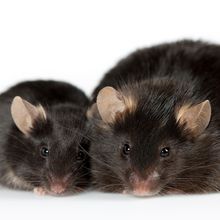Login
Subscribemicrobiome, immunology

The COVID-19 Pandemic Abruptly Altered the Infant Microbiome
Kamal Nahas, PhD | Jan 4, 2024 | 4 min read
Microbial diversity in the infant gut shrank suddenly during the first lockdown, but the lasting health effects are less clear.

The Vaginal Microbiome is Finally Getting Recognized
Hannah Thomasy, PhD, Drug Discovery News | Sep 25, 2023 | 10+ min read
Vaginal dysbiosis has long been a taboo subject, but studying and optimizing the vaginal microbiome could be a game changer for women's health.

Spatial Multiomics Reveal Microbiome-Linked T Cell Modulations in Human Graft-Versus-Host Disease
The Scientist | 1 min read
In this webinar, Benton Berigan will highlight the value of combining multimodal data, including spatial information, to understand complex immunological processes.

Vaginal Delivery Promotes Early Childhood Vaccine Response
Jennifer Zieba, PhD | Aug 8, 2023 | 3 min read
Researchers showed that the delivery method affects the microbiome and plays a role in the infant vaccine immune response.

Antimicrobial Resistance: The Silent Pandemic
Danielle Gerhard, PhD | Jun 30, 2023 | 9 min read
Scientists continue to ring alarm bells about the risks associated with the continued misuse of antimicrobials and advocate for innovative treatments, improved surveillance, and greater public health education.

Modulating the Immune Response to Vaccines
The Scientist | 1 min read
Researchers uncover innovative natural approaches to fine-tune immunity from vaccination.

A Bacterial Culprit for Rheumatoid Arthritis
Hannah Thomasy, PhD, Drug Discovery News | Apr 27, 2023 | 4 min read
Scientists identified a species of Subdoligranulum that may drive disease.

Gut Bacteria Help T Cells Heal Muscle: Study
Natalia Mesa, PhD | Mar 14, 2023 | 4 min read
Regulatory T cells in the colon travel to muscles to promote wound healing in mice, raising questions about how antibiotics may impact injury recovery.

Leveraging the Microbiome to Break Down Tumor Resistance
The Scientist and PerkinElmer | 1 min read
Mat Robinson and Mark Tangney discuss how enhancing the efficacy of immune checkpoint inhibitors improves patient outcomes.

Mice With a Healthy Gut Microbiome Are More Motivated to Exercise
Katherine Irving | Dec 16, 2022 | 4 min read
A neural pathway between the gut and the brain led to the release of dopamine when the mice ran on a wheel or treadmill, but only in the presence of a robust microbiome.

Infographic: How Immunology Can Influence Pregnancy Outcomes
Tobias R. Kollmann, Arnaud Marchant, and Sing Sing Way | Nov 14, 2022 | 3 min read
Pregnancy-induced changes in the immune system are key to a successful birth. Understanding those changes could allow researchers to protect both mother and child.

Aging and Cancer: A Complex Relationship
The Scientist | 2 min read
An expert panel will discuss how aging affects cancer risk, development, and treatment practices.

Modulating Immunity to Improve Pregnancy Outcomes
Tobias R. Kollmann, Arnaud Marchant, and Sing Sing Way | Nov 14, 2022 | 10+ min read
Aberrant immune activation, the main cause of prematurity and stillbirths, could be preventable through interventions such as maternal vaccination.

Obesity Protects Against Genital Herpes in Mice, Study Finds
Katherine Irving | Nov 11, 2022 | 3 min read
A high-fat diet induced changes to the animals’ vaginal microbiomes that boosted survival after exposure to the virus.

How Infectious Diseases Affect the Brain
The Scientist | 1 min read
From a loss of taste to dementia, infectious agents cause an array of neurological symptoms.

How a Specific Gut Bacterium May Cause Type 1 Diabetes
Dan Robitzski | Aug 25, 2022 | 5 min read
A bacterium that produces an insulin-like peptide can give mice type 1 diabetes, and infection with the microbe seems to predict the onset of the disease in humans, a study finds.

Mapping the Neighborhoods of the Gut Microbiome
Abby Olena, PhD | Jul 1, 2022 | 7 min read
Researchers are going beyond fecal samples to understand how the patterns of commensal microbes in the gastrointestinal tract influence development and health.

Banking Previous Poos: Could a Transplant of Feces from Your Past Heal You?
Dan Robitzski | Jun 30, 2022 | 9 min read
The Scientist spoke with Brigham and Women’s Hospital and Harvard Medical School researchers Scott Weiss and Yang-Yu Liu, who propose that people bank stool samples when they’re young and healthy so that they can be transplanted to rejuvenate the gut microbiome later on.

Engineered Bacteria Make Tumors More T Cell-Friendly
Aparna Nathan, PhD | Apr 8, 2022 | 5 min read
Microbes designed to produce specific immunomodulatory metabolites could give immunotherapy a boost.
